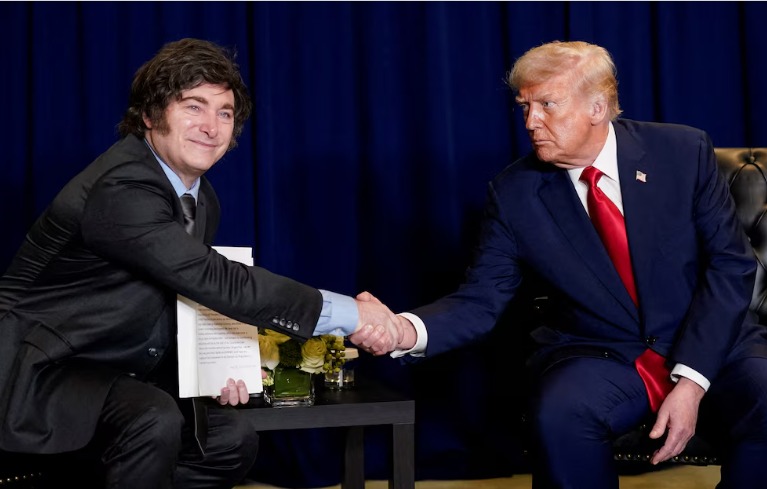
Ten wheels away from the electoral scenario of October 26, Thursday’s day ended with an unexpected twist. In another post on social network Scott Bettingconfirmed the purchase of pesos in the local currency market. Without specifying the amount of the operation – which, according to reports, would have been channeled through Banco Santander as an intermediary – it is a direct and unprecedented intervention. Everything happened without prior communication from the national government and without knowing what such a gift was given in exchange for.
“If the Government wants to continue participating in the spot, it should very soon start selling the BCRA (or the Treasury should buy dollars from the Central Bank),” says a report by the consulting firm 1816. This maneuver confirms that the national Treasury ran out of dollars: the wholesale price reached an intraday peak of $1,470, and then closed at $1,420 after the imperialist intervention. The dollar does not float; the visible hand of the US Treasury continues to demonstrate it. Recapitulating: how did it come to this?
Caputo and his team spent several days in Washington negotiating the bailout with the US Treasury and the IMF, while in the city of Buenos Aires the Treasury dollars were draining away without being able to stop the exchange rate run. So far in October, Treasury interventions to keep the wholesale dollar within the exchange band have liquidated the 2,252 million dollars advanced by the cereal companieswhich entered due to 0% withholdings.
The measure was a million-dollar gift to large exporters, with a very high fiscal cost; for these multinationals, it did not matter to sacrifice fiscal balance. An LCG report states “during September, private deposits in dollars grew by around USD 1.5 billion, driven by agricultural settlements under the zero withholding scheme.” In the hands of the cereal companies, a part of the pesos obtained ended up adding pressure to the dollar.

One of the most asked questions in recent days was: What happens if help comes through elections? Does the government have the firepower to reach October within the band? “The problem is not only whether he has enough dollars until the elections, but how he manages to generate expectations for afterwards. Is the exchange band scheme ending? Why were the dollars spent before if it was known that the scheme was going to be modified later?” held the journalist specialized in economics, Estefanía Pozzo consulted by this means.
And he added: “The number of questions questioning the criteria of the economic team undermine its credibility, therefore also its room for maneuver to make decisions in the future.” The uncertainty about the economic direction remains constant, while Milei and Caputo’s plan is shipwrecked in full view of everyone. The demand for dollars for pre-election coverage or due to the expectation of devaluation continues. Since April, the price has continued with constant increases, reaching peaks at the most critical moments of the government.

Electoral bailout, and after?
“Today we directly buy Argentine pesos,” says the US president in the message sent by X, in which he confirms the return of the Argentine mission led by Luis Caputo. It was the first measure taken after weeks of showing support for the Milei government in posts, which failed to calm the nervousness of investors.
It is also confirmed that the currency swap between the BCRA and the FED as one of the legs of the rescue, although there is still no effective date or return rate, nor is it known what the availability of these funds will be. “We have finalized a $20 billion currency swap framework with Argentina’s central bank. The U.S. Treasury is prepared, immediately, to take any exceptional measures necessary to provide stability to the markets.”
In addition, the post is completed with promises of investment from American companies and with a nod to the continuity of the band exchange scheme. In times of videopolitics—or communication dominated by social networks—these are words that seek to calm spirits and sustain expectations until the elections.

Caputo arrived in Washington in despair, with a government going through a deep political crisis after the narco-scandal involving Espert, former LLA candidate, and with Milei at the center of international media criticism for the bizarre show at the Movistar Arena, while the economic crisis deepens social unrest. It is an economic rescue, but also a political one.
And all this in exchange for what? For the editor-in-chief of the Buenos Aires Herald, “The negotiations are being carried out in the midst of the government’s worst political moment and that is never good, both because they can impose more conditions and because they can also withdraw support (let’s not forget that the United States is in the middle of the shutdown and there are questions about possible assistance to Argentina). Furthermore, time is against them: an agreement or assistance that does not convince the market is as bad as an agreement that is not concrete. Using the silver bullet has that risk: if it doesn’t work, the speed with which control of the agenda is lost is very high. and in those contexts making decisions is very complicated.”
The government is buying time until next Tuesday’s announcements, when Milei and Trump meet. So much support is not freehand in hand with this government the delivery of the country deepens.
The great scam
Without dollars, because they spent them all on financing financial speculation, now the Government is finalizing details of a new lifeline. In addition to the swap, it could include an eventual loan from the US Treasury through its Exchange Stabilization Fund, similar to the one Mexico used during the tequila crisis.
Donald Trump has been highly questioned in his country for the rescue in question, after Bessent’s post the reactions against him multiplied. “What I omitted in my previous note is that this rescue was not only aimed at saving the ‘Elon Musk of the South’, but also Bessent’s friends in the hedge funds,” denounces the economist. Paul Krugman. Different media outlets like the NY Times support the same line, they are getting involved now to make it easier for their friends to get out before everything collapses. These criticisms have already been seen in newspapers such as Financial Times which this week titled its note “Argentines lose patience with Milei’s economy” or The Guardian.
During the Milei government, state salaries fell by 19% in real terms, private salaries by 5%, while retirements collapsed by 23%, according to data from the Mirador de la Actualidad del Trabajo y la Economía (MATE). The Fund calls for greater adjustment and confidence in the plan, but what is really increasing is social discontent. The family debt rate is record high, while job insecurity increases, reaching 7 out of every 10 young people. The fiscal chainsaw, with the dollar behind, only served to benefit friendly businessmen, the investment funds that are now seeking to exit, at the cost of worsening the living conditions of the social majorities.
Faced with this catastrophic social scenario, the head of the IMF got involved in the electoral campaign and declared: “We have seen brave leaders who cut pensions and salaries by 40% or 50%, and were re-elected.” It was within the framework of the Annual Meetings of the IMF and the World Bank, he maintained that in Argentina the “success” of the fiscal adjustment plan will depend on the “people accompanying.”
Foreign debt only reinforces this path of fierce adjustment, delivery of strategic goods and greater interference in national affairs by big capital. Economist Noemí Brenta warned in a radio interview (AM530) that getting out of debt only prolongs subordination: “The IMF has a double standard: it uses debt to dominate and appropriate the wealth of countries. Argentina must prioritize its sovereignty over any external obligation.”
While Milei and Caputo’s plan drags us into a mortgaged future of misery, Peronism’s solution to a problem as central as external debt continues to be “negotiate a little better”kick deadlines, but somehow pay. Axel Kicillof declared that “breaking with the IMF is childish”and as a solution he proposed sitting at a table with the Fund’s usurers to talk about possible solutions. This path is doomed to failure.
Argentina is the largest debtor of the Fund with US$ 57,294 million35% of the total provided by the organization. In addition, it receives direct intervention from the Trump government without prior communication. The only one exit in self-defense, of the working people is to denounce this electoral pact of surrender to the US, break the submission agreement with the IMF and impose with a great popular mobilization the non-payment of the odious debt.
Source: www.laizquierdadiario.com

